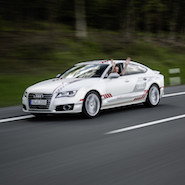German automaker Audi is continuing to pave the way for piloted vehicles with its latest A7 developments.
The piloted Audi A7 concept has been tested alongside other road users and now is capable of adaptive driving, creating a more human driving resemblance. Autonomous vehicles are now publicly visible and tangibly close to availability, meaning that the details of piloted driving are now the target of the spotlight.
“Audi has been in the forefront of this type of technology,” saidaid Lauren Fix, automotive expert, Lancaster, NY. “There are other manufacturers that are utilizing autonomous vehicles in cities, as Ford has their own town that is for testing only; Mercedes, Volvo and others are testing around the world as well.”
Human machines
Thanks to German automakers Mercedes-Benz and Audi, the general public is starting to see autonomous vehicles become a reality after years of mostly behind-the-scenes progress.
Even at the beginning of the decade, autonomous vehicles seemed more like an idea out of science fiction than an imminent reality, but development by Google and other tech companies and automakers has gradually brought the possibility to light. While the race will continue for years, consumers are getting their first look at the not-so-distant future (see story).
Among the concerns that have risen as autonomous vehicles have begun testing is that they do not convincingly replicate human driving behaviors. People will ease into an intersection before turning and brake and accelerate more gradually to and from a stop than vehicles that drive themselves.
Additionally, people will make changes based on other vehicles by passing trucks with larger lateral gaps or will ease toward the edge of a lane before completing the change, helping other drivers to clarify its intention.
The new Audi A7, codenamed “Jack,” has now demonstrated its ability to handle these situational, specific tasks during tests on the autobahn. Likewise, it will determine whether to accelerate or brake to let a vehicle enter its lane based on the overall traffic situation, demonstrating an intelligence and decision making capability that skeptics fear autonomous vehicles would lose.
“Humans make different decisions than computers, humans tend to use common sense and experience work computers use logic,” Ms. Fix said. “That is very hard to program and each person has a different thought process so the car will have to learn each driver. Jack may be the future of that type of programming.”
Jack will have a central driver assistance controller, or zFAS, to process and evaluate signals and information to create a model of the vehicle’s surrounding. It will build on the same traffic assistance technology already available in the brand’s A4 and Q7 models.
In addition to the recent round of Autobahn testing, Audi has tested its piloted vehicles on highways west of Las Vegas. Audi regularly documents the progress it has made in its piloted vehicles in public forums to generate publicity and impress its leadership in the technology upon consumers.
Testing the vehicle in real world conditions will further sell consumers on the technology that, until recently, had more in common with science fiction than reality. As automakers clamor to reach the market first without compromising performance, winning over the public is an important step.
Audi is now moving on to further testing on the Autobahn, where the road will be outfitted to assist in car-to-car communication and helping to map traffic signs and lane markings more precisely. Different types of pavement and materials will be tested through at least 2018 to further enhance the autonomous driving experience.
The A7 will accordingly feature a more sophisticated navigation system that will compute routes based on the proportion of roadway outfitted for autonomous vehicles.
To the future
As the age when “drivers” can relax in the vehicle draw near, some automakers are introducing concepts that will help visualize the futuristic technology and highlight the advantages for the consumers.
For example, at last year’s Tokyo Motor Show, German automaker Mercedes-Benz looked beyond the millennial market to the age of autonomous vehicles with its “mobile club lounge.”
The “Vision Tokyo” concept model is an electric-powered, autonomous driving vehicle aimed at the urban trendsetters of Generation Z. A variety of technological advances are presenting automakers with enormous opportunities to redefine the luxury automotive market (see story).
Likewise, German automaker BMW is marking its centennial not only by looking back, but also by looking forward.
On the morning of March 7, the BMW Group Classic building opened its doors to journalists for the first time and gave a press conference detailing its centenary, with a celebration and multimedia of the brand’s history and accomplishments following later that afternoon. Rather than contenting itself with prior achievements, however, the brand’s milestone motto is “The Next 100 Years,” and a series of events, publications and technological advancements will help the brand maintain its status over that time period (see story).
“This is very critical for Audi because they have been developing autonomous vehicles since 2009,” Ms. Fix said. “Their goal is to merge consumers with their vehicles wake consumers merge with their technology.”
from
http://redirect.viglink.com?u=http%3A%2F%2Fredirect.viglink.com%2F%3Fu%3Dhttps%253A%252F%252Fwww.luxurydaily.com%252Faudi-humanizes-piloted-driving-with-latest-autonomous-testing%252F%26amp%3Bkey%3Dddaed8f51db7bb1330a6f6de768a69b8&key=ddaed8f51db7bb1330a6f6de768a69b8




No comments:
Post a Comment